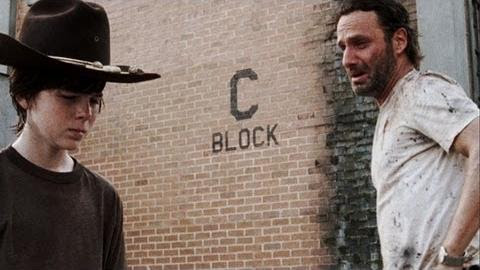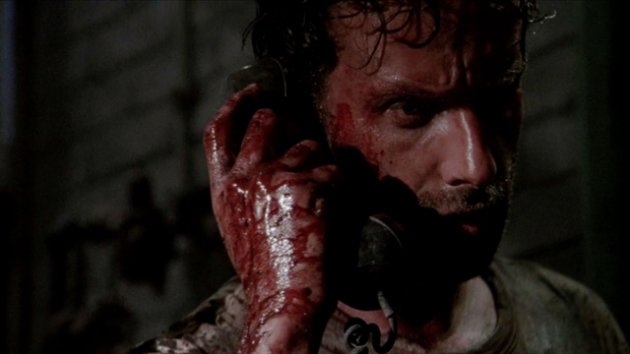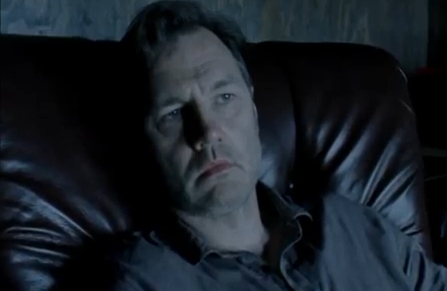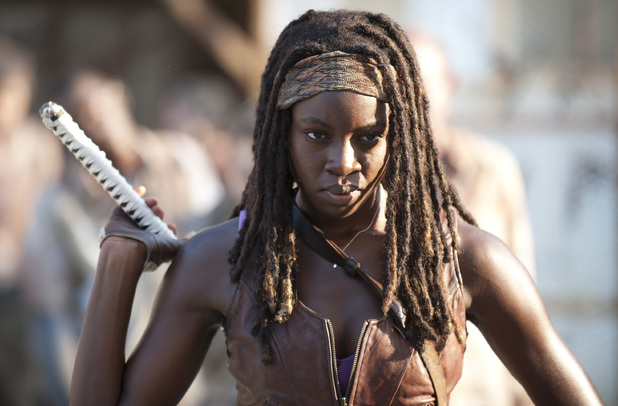
The biggest criticism of The Walking Dead's second season is that little happens in the first six episodes. But with all the action and character dynamics in play throughout the first half-dozen episodes of Season 3, no one will be able to fault the show for treading narrative water this time. Because after two seasons of mostly setup, it's clear that Season 3 is all about payoffs.
So much has happened since the last time I wrote. This season's fourth episode, "Killer Within," was maybe the most devastating to date. Prisoner Andrew, who we all assumed was as good as dead when Rick trapped him in a courtyard with a handful of walkers (and who we now know was the one surveilling the prison from the woods), ended up escaping. Then, in giving new meaning to the expression "paybacks are hell," he lured more walkers into the prison and waited for the shit to hit the fan. When it did, T-Dog unexpectedly and disappointingly bit the dust (so much for having a bigger role this season), Carol was presumed dead, and Lori didn't survive childbirth while hiding from a horde inside the prison.
How's that for karma?
"Man, can't we just have one good day?" asked Glenn before all hell broke loose. On The Walking Dead, the answer is no. But the bigger message the show is reminding us of early on? No one's safe, no matter where they are.
A Bad Day for the Grimes Family

I don't know if it gets any crazier than the negation of negation in "Killer Within," when Carl witnesses his half-naked mother give birth under zombie duress, helps deliver his baby sister, and then shoots his mom in the head. He seems to be taking it as good as anyone could, but you hope for Carl's sake that there are some psychiatrists still left in the world.
Rick is someone else who could use some mental help. After his initial grief-turned-rampage pushed him into madness, the big question is: Did he imagine those four phone calls, or did they really come from beyond (the spirits of Lori and first-season casualties Amy, Jim, and Jacqui)? It's a fair question. Because aside from Hershel's reference to his phantom phalanges, there was another mention of actual ghosts from prisoner Axel in "Killer Within":
"We can't live in that place another minute, you follow me? All the bodies, people we know. Blood, brains everywhere. There's ghosts."It'll be interesting to see if The Walking Dead adds a true supernatural element to its survival story. No wonder I've been telling myself that The Walking Dead is my new Lost.

It's clear that the compromised prison ("It's not safe enough.") is a metaphor for Rick's mental state ("We're dyin' here."). In a matter of days, his so-called "perfect" safe haven became vulnerable, making evacuation the next best option in his mind. In reality, without any lurking saboteurs, the prison couldn't be a safer, more secure place. But I'm sure something will uproot them by the end of the season.
Part of me thinks that the phone calls to Rick were real because of how Lori picked Rick up in the final conversation and urged him to take care of Carl and his baby girl—which may be the only way he keeps his head on straight. Rick picking up his daughter for the first time and seeing the tears forming in his eyes was one of the more beautiful moments in this series. I'm looking forward to the scene where Rick and/or Carl names her.
Give credit to director Guy Ferland for the scene's dramatic framing, and to Andrew Lincoln (Rick) for turning in an absolutely heartbreaking performance when he saw Carl and the baby, but no Lori. Also terrific was Lauren Cohan (Maggie), whose lips were trembling so uncontrollably that her non-response to Rick said everything about Lori's fate.
And Rick, when you think of Lori, think of this last look the two of you shared:

Welcome to Woodbury—Mayberry, But Not

In the third episode, "Walk with Me," we were introduced to Season 3's main antagonist, the Governor (real name: Philip), and the picture-perfect town of Woodbury that he runs. Played by British actor David Morrissey with steady Southern charm, the Governor starts out as a seeming good guy who does his best to provide a return to normalcy for Woodbury's inhabitants. "I'm just a guy trying to do right by the people I care about," he says. But it doesn't take long to see that it's all a front for something much larger and potentially sinister.
It's still a little murky to me why the Governor murdered the helicopter pilot's fellow soldiers. Did he feel threatened that the military would take control over Woodbury? Was he eager to commandeer their weapons and supplies? Did he need some more human trophies for his aquariums? Or all of the above?

Given his golf-ball scene with Merle, we know the Governor's a control freak who loves the community he's created in Woodbury maybe even more than his old life, enough to where he would die to save his creation. But under Woodbury's facade, there's an agenda dark enough for him to manipulate and insulate his people from. It's his world and his cult, and I'm anxious to see what sacrifices he makes to protect his beloved town—or his walker daughter, Penny.
Speaking of, how creepy was it to see him forcibly combing her hair as she fought to bite him? Like Hershel and his barn full of family walkers, the Governor's holding out hope that one day there'll be a cure, which I believe will be the ultimate endgame of The Walking Dead:
"Do you think they remember anything? The person they once were?... Milton believes there might be a trace of the person they were still trapped inside."On a related note, I'm curious to know when the show will reveal what caused the outbreak in the first place, and by what universal mechanism (sunshine, the water supply?) the virus was spread to all humanity. I'm thinking the answer's revealed in the penultimate season, leaving the final season to finding and obtaining the cure.
Enter the Warrior

One person the Governor has no answer for is Michonne. Her trademark kitana and quiet warrior mentality is already one of the highlights of this season. Though I have to say that I think actress Danai Gurira probably overplayed Michonne's intense suspicion and unchanging scowl around Woodbury, and she may have seen through everything—the Governor, the firefight with the soldiers, and the captive walkers—about as fast as she offed her longtime walker slaves. "This place is not what they say it is," she warns Andrea, who you know instantly flashed back to this line when she witnessed the bizarre Woodbury Fight Night. But here's one clue to Michonne's Spidey sense, and it's from the sword-wielding heroine herself: "My shit never stopped being together."
In the sixth episode, "Hounded," I love Michonne's Arnold Schwarzenegger/Predator moment, when she realizes that zombie guts make for great camouflage. And this leads to an incredible closing scene, with Rick approaching the perimeter of the prison with a puzzled look on his face. Beyond the approaching gaggle of walkers is Michonne in tow, and for the first time, we see her with a genuine "help me" look and need for others. It's another one of those special Lost-like moments where we witness the beginning of great characters crossing paths and forming new alliances in a topsy-turvy world. But my favorite part is how Michonne brought along the basket of baby formula. It says so much.

With Michonne joining Rick's group and Merle taking Glenn and Maggie hostage, boy oh boy is there a war coming. Throw in complications with the Andrea and Darryl's loyalty between members of the two groups, and my only thought is: How awesome are the next few episodes going to be to close out the first half of Season 3?
The Stream of Bullets and Arrows:

- I'm still wondering about the military chopper that crashed at the beginning of the third episode. Did it go down due to malfunction (as the pilot Welles implied), or did the Governor's people shoot it down? What sounds like a gunshot can be heard just before the whirlybird spins out of control.
- Am I the only one who thinks that Milton (the Governor's nerdy right-hand man) could be up to something with his special tea, like some sort of brainwashing or conditioning agent?
- Do all the slashes in the Governor's journal represent days gone by or biter kills? Or something else?
- Andrea may not have been big on Woodbury's "brutality for fun" entertainment, but as we've seen with Rick and Michonne, human culture is gradually changing to treating walker slaying like its own sport. Look no further than the satisfaction that washed over Andrea's face when she jumped Woodbury's wall to take down an approaching biter. "You don’t have to be ashamed about liking the fight or fightin' the fight," says the Governor. "I love it. It's not the only thing, but nowadays it’s part of being alive. Really alive."
- Oscar, you've proven your loyalty by shooting your fellow inmate Andrew in the head instead of Rick. Welcome to the family. Axel—you too, bro.
- Carol, welcome back to the land of the living! And who better to carry you off to safety than Darryl?
- For me the most likable character on the show continues to be Darryl, a tough guy with a soft side (how about those baby-daddy skills?). He's become a solid second-in-command to Rick, which only makes his long-impending reunion with Merle all the more conflicting in advance. The Los Angeles Times is a Darryl fan, too.
- I loved the tense dynamic in the scene where Merle threatens Glenn and Maggie as Michonne looks on in hiding. As a viewer, you wanted Michonne to intervene, but there was probably no way she could have done it without giving Merle an advantage.
- I get the feeling that the Governor didn't quite buy that Merle killed Michonne but wasn't able to produce her head and sword because he "got caught in a crowd." Keep an eye on that.
- Bitergram – The Walking Dead's first meme?
No comments:
Post a Comment